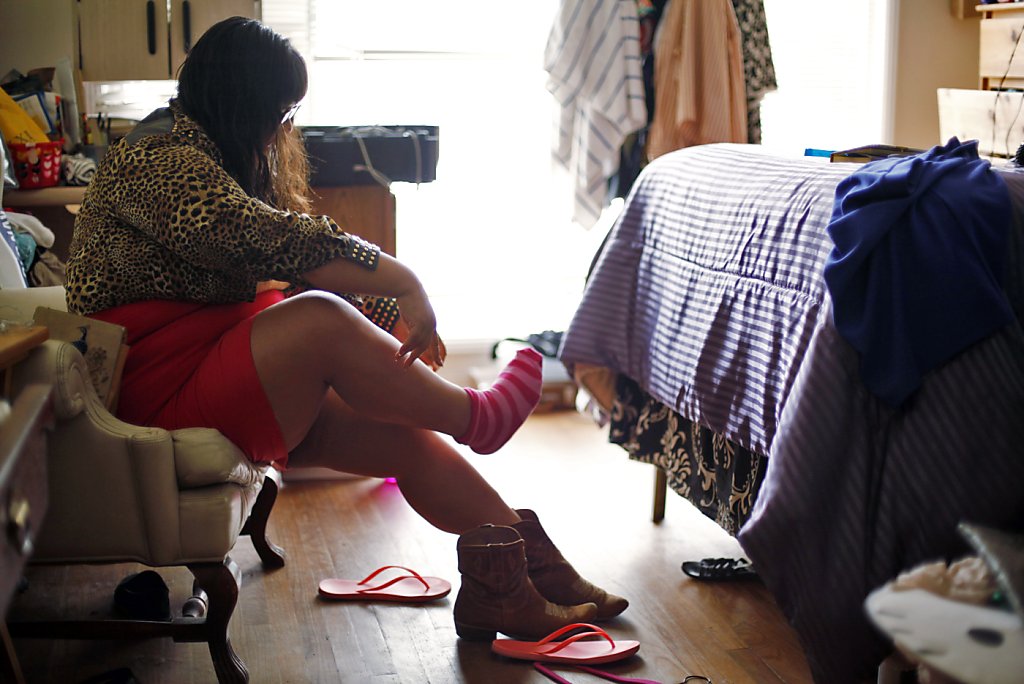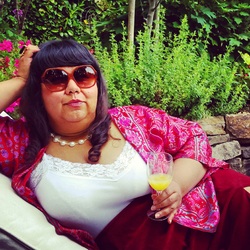|
Vulnerability is not something I do well. I have put a lot of time and energy into creating my armor - the emotional encasing I create to arm me against a culture that attacks my body because I am a woman and I am fat and I am a person of color. So, when I saw the main image used in a recent article on the American Medical Association's decision to classify obesity as a disease I fought the feelings of betrayal and intense vulnerability that I felt.
The article's author asked if the Chronicle could come into my home and photograph me blogging about the AMA decision. When the photographer arrived he in fact did take multiple images of me blogging in my home and at a cafe near my apartment where I often blog. Not a single one of them made it into the article. I wrote to the Chronicle voicing concern and asking for answers on their choice, but I wanted to share the letter I wrote to the photographer because I spent over an hour with him, sharing my thoughts, my history and my home: Hi, I'm writing because I wanted to voice a sense of the vulnerability that I shared with you and the Chronicle in letting you into my home to allegedly take photos of me blogging, and the feeling of betrayal and disappointment I feel now. I am unclear whether you were specifically told that you were actually going to take pictures of me doing mundane things in my bedroom in some of the most vulnerable positions imaginable. I am so disappointed with the sense of gawking fatphobic voyeurism that came through in the main image for the article. Let me be clear - it is not my body that makes me feel disappointment; it is the clear intention of that image and the callous use of my body as a fetishistic object held up for scrutiny; it is the desire to showcase my body as part of a landscape in which I am constantly in struggle or tragically at odds with my body - neither of which are the case. After having done work with the Chronicle previously and found my image (and my body) treated respectfully I thought that I could trust you. I have defended media outlets and affiliated photographers to friends, activists, and colleagues, but you have become part of a valuable lesson - one that will make stories like this increasingly more difficult to find any friendly collaboration on, as I do plan to write about my analysis of this experience and this image. Virgie This image of my body attempts to evoke the kind of sentiments that promote fat shame and fat discrimination and that help to perpetuate an emotional and political climate that makes decisions like the AMA's possible. Let me be clear: my body is not an object of shame to me. This image does not elicit a sense of shame or disappointment in or toward me. My body - and images of this radical, outlaw body - cannot be used against me. It will not be used against me. These images have already become part of my archive, for my pleasure, for my wonder, for my enjoyment and interest and contemplation. I have reinterpreted them, disrupted their intention and their meaning. Every day I live the resistance against the public's desire to see me as an object upon which it can hang its anxiety, guilt, shame and fear. Every day I fight to make my body my own. Let me be clear: the intention of this image and the circumstances under which it was taken are hurtful to me, but this image, this body - they are mine.
Lauren
6/29/2013 06:27:15 am
THANK YOU.... thank you so much. 6/29/2013 08:02:44 am
I really hope you get a reply from the photographer. I'm often very liberal with sharing whatever a photographer wishes me to share and I would be horrified to find out that a photographer did something fatphobic with my images (it's bad enough having your pictures stolen to be mocked which has happened to me on several occasions). It's a vulnerable position to be in and it's wrong that they took advantage of that and of you. I'm so sorry this happened to you.
Me
6/29/2013 11:20:08 am
We all need to get out of our heads that who a person is or even how they look is all about being fat or thin. I have recently seen women who get categorised as "fat" dancing with a skill and grace which makes a mockery of thinking they are less fit than some thinner people (most people really). Anyone who can dance with confidence and joy is automatically beautiful even before you factor in the great outfits and hairstyles on these people. I wasn't brave enough to really dance so I wasn't beautiful. But that wasn't because I am fat, it was because I was too scared...and that is a problem with society, not with my body.
Luna Maia
7/4/2013 02:45:17 am
I wanted to let you know that I respect the work that you do to end fatphobia and you have my support! I love that you're claiming your body and images of it for yourself. It's a hard-won ownership for any of us, and you rock for accurately naming the damage a seemingly "innocent" photo can do. (Although, one thing I take away from that picture is that you have a great sense of style.)
Marilyn Wann
7/10/2013 12:52:16 am
Brilliant response! Local media are screwed if local people refuse to talk to them. I appreciate knowing about this photo...sorry I missed it at the time. I'll likely decline to be photographed by SF Chronicle, and reference your experience, if the question comes up. Comments are closed.
|
Virgie Tovar
Virgie Tovar, MA is one of the nation's leading experts and lecturers on fat discrimination and body image. She is the founder of Babecamp (a 4 week online course focused on helping people break up with diet culture) and the editor of Hot & Heavy: Fierce Fat Girls on Life, Love and Fashion (Seal Press, 2012). She writes about the intersections of size, identity, sexuality and politics. See more updates on Facebook. Archives
April 2021
Categories
All
|




 RSS Feed
RSS Feed